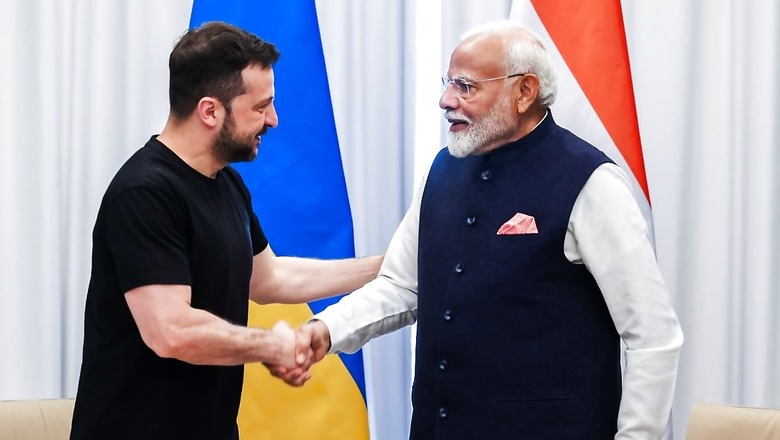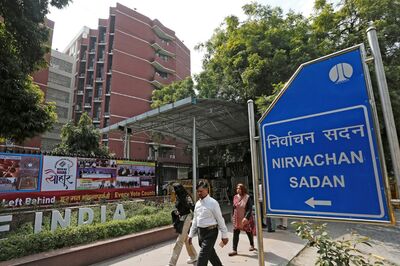
views
Prime Minister Narendra Modi’s visit to Ukraine on August 23, though not officially announced, seems to be in the offing. It is not clear why information about this planned visit has been prematurely leaked to the media. One can also speculate about why this visit is taking place and what it seeks to achieve.
It is known that the Ukrainians have been very keen on a visit from India which could be projected by them as signifying more understanding for the Ukrainian cause and a more even-handed Indian approach. Many world leaders, especially from the West, have visited Ukraine as a show of support to President Volodymyr Zelenskyy. The Ukrainian President has travelled extensively, primarily to Western countries, and has been invited to attend multilateral forums such as the G7 meetings. There was pressure on India to invite him to the G20 summit presided by India, but India did not oblige.
For Ukraine, a visit from India, as a major non-Western country and a leader of the global south, would imply broadened international sympathy and understanding of its position as a victim of Russian aggression. It would also help to dilute the view that the Ukrainian conflict was essentially a mismanaged European conflict, which the Europeans had to resolve, and the rest of the world had to be spared from its unwanted consequences.
PM Modi has, of course, spoken on the telephone to Zelenskyy; they have also met at the G7 summit in Italy when Modi also embraced him. India has also sent humanitarian aid to Ukraine. All this, of course, does not have the same impact as a physical visit by Modi to war-torn Ukraine.
There has been much commentary in foreign policy circles in the West and even at home that India, given its close ties with Russia and advocacy of dialogue and diplomacy to end the ongoing conflict, could play a mediatory role of some sorts. India’s credentials for playing such a role got bolstered by its success in forging a consensus at the G20 meeting on the Ukraine issue. Much has also been made of Modi’s message to Putin at the SCO summit in Samarkand in 2022 that today is not an era of war, which was interpreted in the West as a rebuke.
Ukraine was very keen on India’s participation at Modi’s level at the peace summit on Ukraine organised by Switzerland, and failing that at Foreign Minister’s level, but India chose to be represented by a senior official. India also did not subscribe to the final communiqué issued by the summit.
What could then be the considerations that would underlie the projected visit of Modi to Ukraine? These could be multifold.
Modi’s visit to Moscow for the resumed India-Russia summits coinciding with the NATO summit in Washington D.C. has irked the Americans and they have made no bones about it. It appears that they advised India to consider a change of dates for the visit. The US National Security Adviser has publicly stated that the US has been in touch with India on its concerns about Modi’s visit, with the State Department telling the US Congress that they had had a tough conversation with India on the subject. That the visit also coincided with the bombing of a children’s hospital in Kiev and Modi greeted Putin with an embrace provoked a fiery response from Zelenskyy himself. He accused India of administering a devastating blow to peace in Ukraine and he deplored Modi’s embrace of a war criminal. This outburst prompted the Ministry of External Affairs to summon the Ukrainian ambassador in Delhi to register India’s protest.
It could well be that to manage the negative fall-out of Modi’s Russia visit and prevent it from festering and being exploited by anti-Indian elements in the US establishment in months to come, it may have been decided to scotch this by making a gesture to Ukraine. It could have been reasoned that India had amply demonstrated that its Russia policy would be dictated by its national interest and not US preferences. A strong signal to this effect had again been sent to the US and the West by Modi making his first bilateral visit abroad after re-election to Russia. In view of this, India had to prove nothing to the US about the core of its position and therefore could afford to make a gesture to Ukraine.
The justification would be that Modi’s advocacy of diplomacy and dialogue to end the conflict would appear more convincing if a message of peace and dialogue was also conveyed directly to Zelenskyy on Ukrainian soil. Such a message would have resonance as it would be entirely different from the message of increasing armed support and continued proxy war that the West is still conveying to Ukraine.
Even if the facts are unclear and there has been no impartial international investigation to ascertain the truth, the fact is that the bombing of the children’s hospital in Kiev while Modi was in Moscow prompted him to reinforce his peace message earlier relayed at Samarkand by expressing his strong anguish publicly during his meeting with Putin about the killing of civilians, and especially children, in war. Modi laboured the point, with an eye on its international resonance.
Modi had hours long one-on-one conversations with Putin in Moscow. He undoubtedly got a clear idea of how Putin assesses the Ukraine conflict. Putin has repeatedly made clear that he is ready for a negotiated solution, but on the basis of accepting the changed territorial realities on the ground. His vision of how the conflict can end and that of Zelenskyy and his government are wide apart. Whether Ukraine can cling to its present position in the face of lack of military success on the ground, heavy losses in men and material, resistance to mobilisation, population exodus, dependence on external support, etc., is considered doubtful, whatever the rhetoric of the government and its Western supporters. The greatest uncertainty for Ukraine is the likely change of government in the US in November with the ascendance of Donald Trump and JD Vance to power, as both want to end the conflict. Europe cannot supplant American support.
In this background, Russia may not be averse to Modi carrying a peace message to Zelenskyy to bring him down to earth. The US would welcome Modi’s visit for different reasons, as some kind of a diplomatic win in seeing India making a nod to Zelenskyy.
India may also have reasoned that China has been promoting peace moves in Ukraine without causing any misapprehensions in Moscow. China had, in fact, appointed a special envoy for peace in Ukraine and made some specific proposals for peace which have been broadly approved by Putin. China and Brazil have announced plans to make a joint peace proposal. India, it can be reasoned, should not allow the peace platform to be monopolised by a country like China that is actually disrupting peace on the India border and the western Pacific. India too could activate its diplomacy without cost, knowing well that the answer to peace in Ukraine essentially lies in Washington D.C.
Interestingly, para 74 of the Joint Statement issued on the occasion of the Modi-Putin summit says that both sides “highlighted the imperative of peaceful resolution of the conflict around Ukraine through dialogue and diplomacy including engagement between both parties. They noted with appreciation relevant proposals of mediation and good offices aimed at peaceful resolution of the conflict in accordance with international law and on the basis of the UN Charter”.
India is endorsing mediatory and good offices initiatives by others, including that of China implicitly, aimed at a peaceful resolution of the Ukraine conflict. Maybe this curious formulation also explains the room created for PM Modi’s peace-oriented visit to Ukraine.
Kanwal Sibal is a former Indian Foreign Secretary. He was India’s Ambassador to Turkey, Egypt, France and Russia. Views expressed in the above piece are personal and solely that of the author. They do not necessarily reflect Firstpost’s views.




















Comments
0 comment